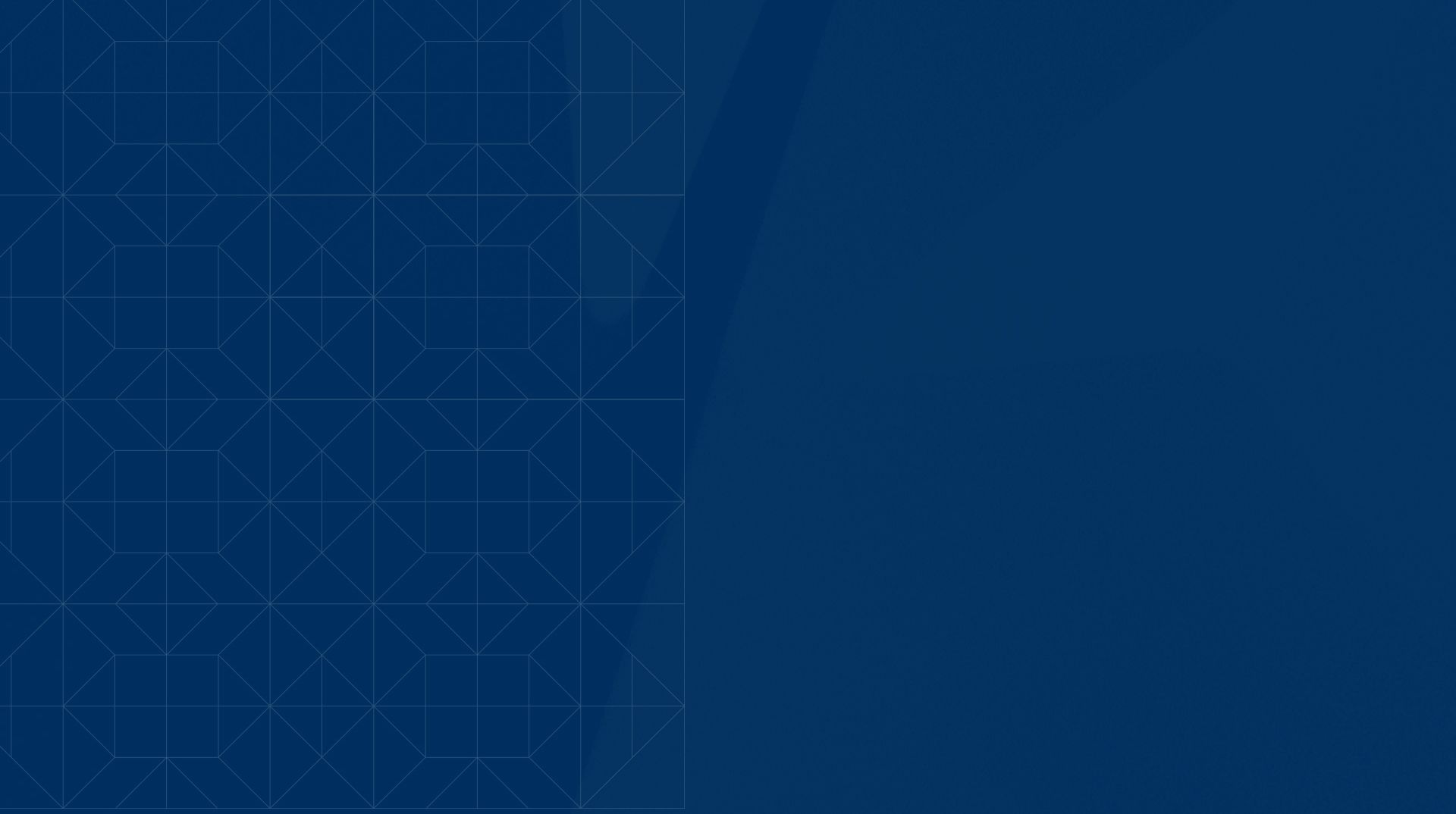COVID-19: Emory on the Front Lines
Emory Magazine | Spring/Summer 2020
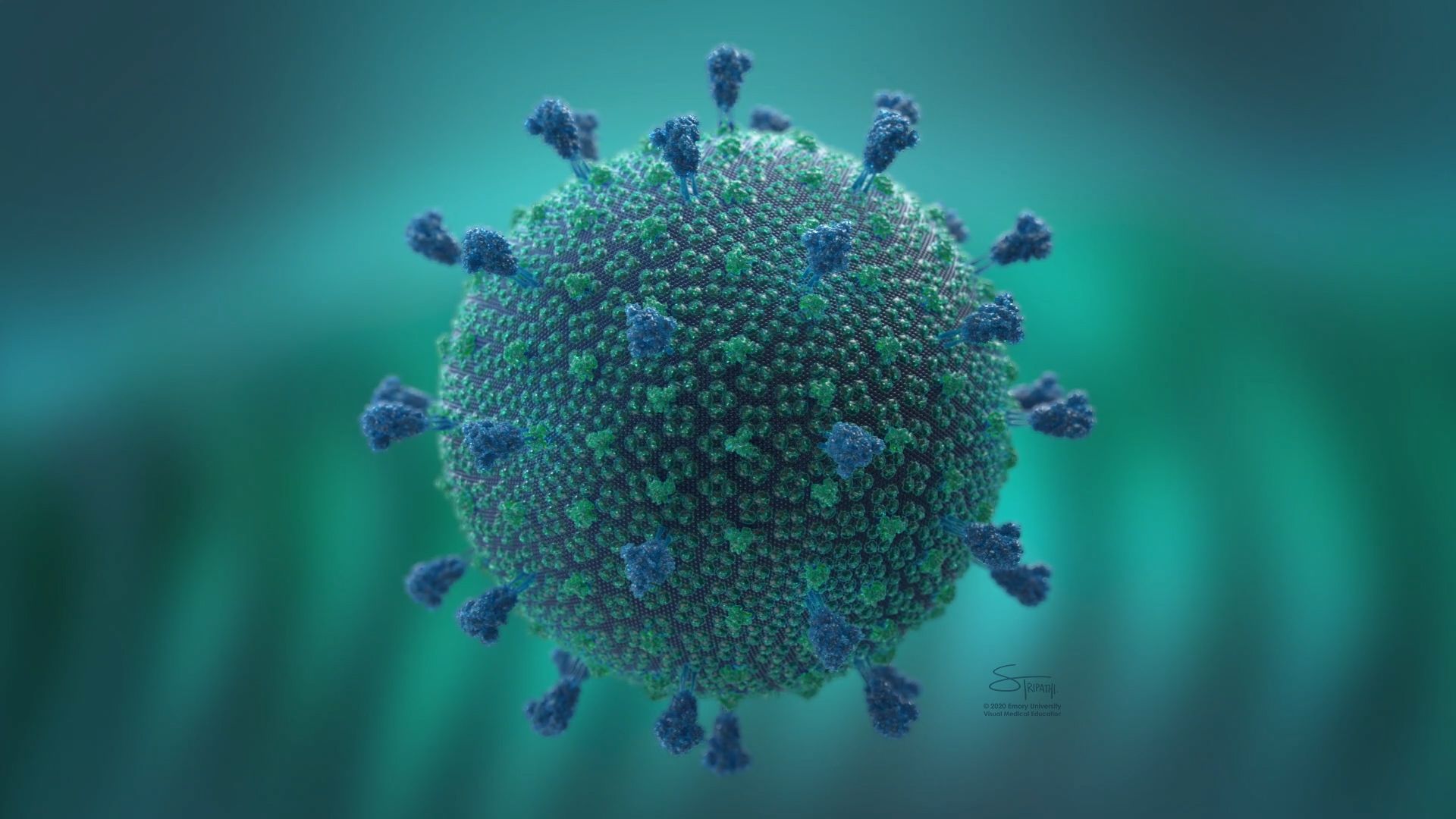
Part 3 in a series of personal stories on how alumni, faculty, and students are fighting the pandemic in a wide variety of ways.
A Voice of Truth and Reason
Find out how alumna Colleen Kraft, one of Emory’s leading infectious disease experts, has become a national media favorite for elevating science and cutting through the noise about COVID-19.
As an infectious diseases physician at Emory University Hospital, Colleen Kraft 09FM 10MR 13G is no stranger to pandemics. Five years ago, she played a lead role in treating Ebola patients who came to Emory during the 2014-16 outbreak. Now she’s helping to coordinate her hospital’s response to COVID-19 as an associate chief medical officer.
But what’s new for Kraft this time is that she is helping to shape the national conversation — and public health policies — on the coronavirus pandemic. Her disarming, no-nonsense demeanor, commitment to speaking the truth, and experience in treating some of the world’s deadliest infectious diseases has made her a frequent interviewee and guest commentator across national and local media these past few months.
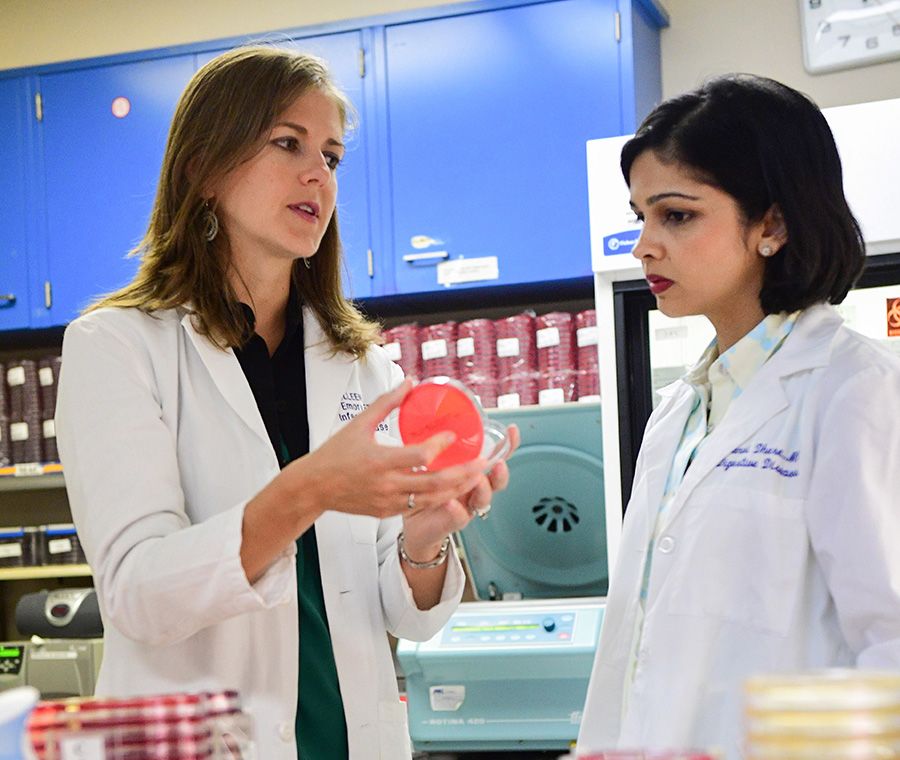
Colleen Kraft (left) is associate chief medical officer for Emory University Hospital and an associate professor of infectious diseases and pathology at Emory School of Medicine.
Since early February, she’s made appearances on CNN, NBC and NPR programs, written op-ed pieces, and was profiled in the Los Angeles Times and the Atlanta Journal-Constitution. Kraft also was named to the NCAA COVID-19 Advisory Panel — where she’s helping provide counsel on when collegiate sports might start up again — and serves on Georgia Governor Brian Kemp’s coronavirus task force.
Despite a stacked schedule, Kraft made time to share with Emory Magazine how she’s balancing her ongoing medical and academic roles — she’s also an associate professor of infectious diseases and pathology at Emory School of Medicine — with her newfound spotlight in the public eye as a voice of reason.

Colleen Kraft (left) is associate chief medical officer for Emory University Hospital and an associate professor of infectious diseases and pathology at Emory School of Medicine.
Colleen Kraft (left) is associate chief medical officer for Emory University Hospital and an associate professor of infectious diseases and pathology at Emory School of Medicine.

Kraft has become a very popular interview for national media because of her expert knowledge on infectious diseases like COVID-19 and her non-nonsense approach.
Kraft has become a very popular interview for national media because of her expert knowledge on infectious diseases like COVID-19 and her non-nonsense approach.
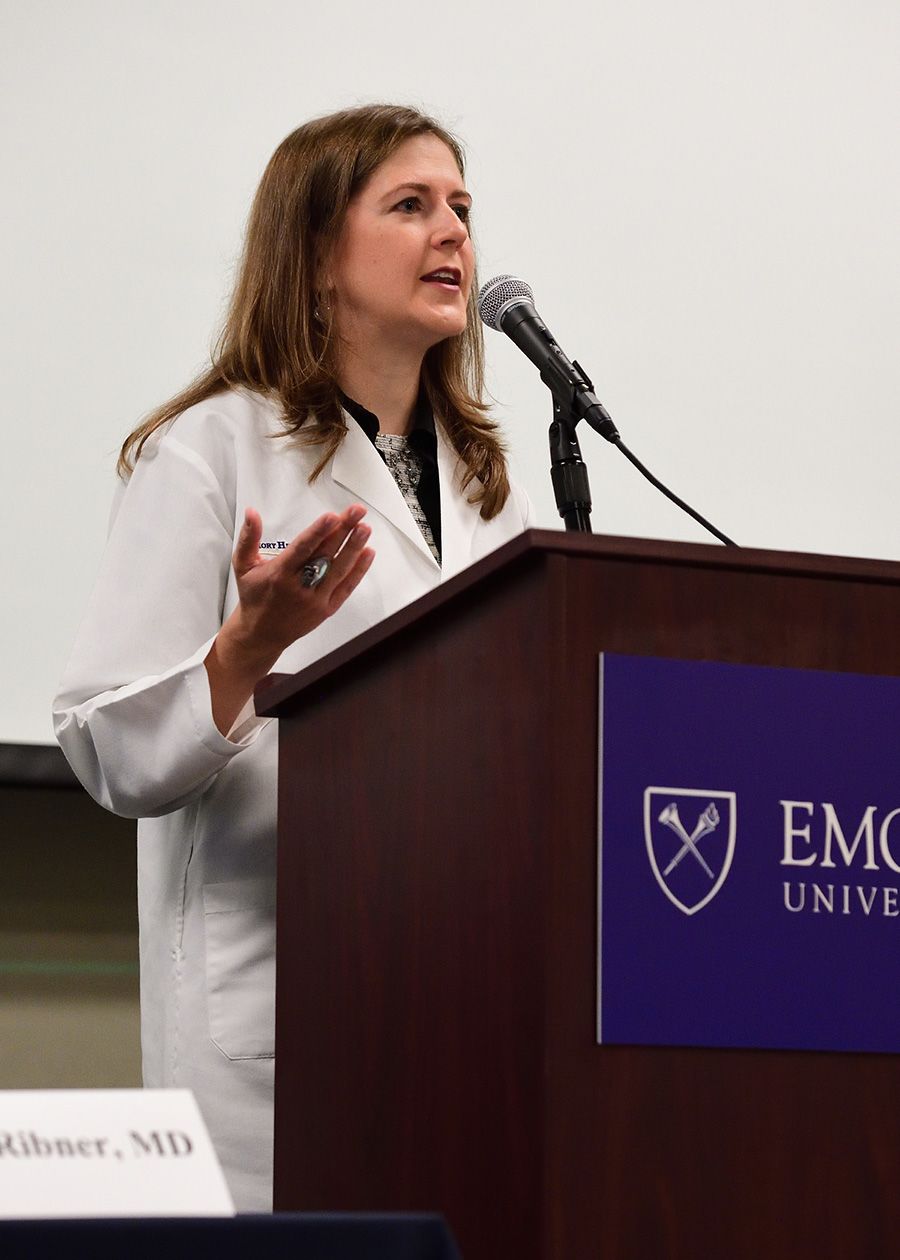
Kraft helped lead Emory's response to the Ebola outbreak five years ago and has become a thought leader on how to respond to COVID-19.
Kraft helped lead Emory's response to the Ebola outbreak five years ago and has become a thought leader on how to respond to COVID-19.
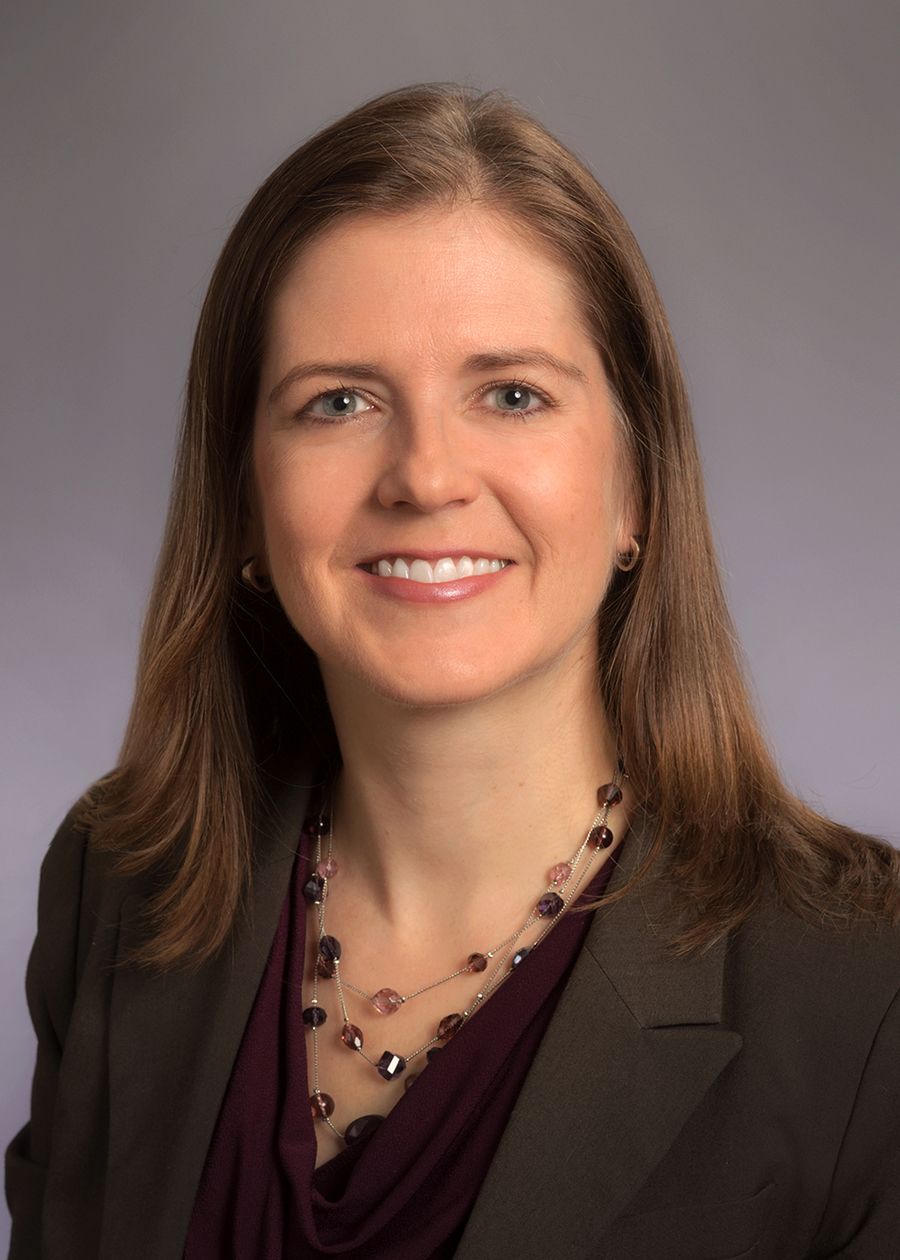
Kraft is an Emory alumna, having earned a master's degree in clinical research in 2013. She also holds a bachelor's degree in biology from Taylor University and a doctor of medicine degree from the Indiana University School of Medicine.
Kraft is an Emory alumna, having earned a master's degree in clinical research in 2013. She also holds a bachelor's degree in biology from Taylor University and a doctor of medicine degree from the Indiana University School of Medicine.
Q: When did you start getting approached by media to speak publicly about infectious diseases and now, specifically, COVID-19?
KRAFT: Five years ago, when I was coordinating the Ebola response, I steered away from these opportunities. I put myself at the back of the line, so to speak. I lacked the self-confidence that I could speak to the media as well as my colleagues could. Fast forward to today and I’ve gained more experience, a lot of it coming from when I was making the scientific rounds to support my own research, which included speaking at a Food and Drug Administration (FDA) hearing. I’ve really learned to enjoy this public-facing aspect of the job. I did my first interview with CNN in mid-February and I must be doing OK because I keep getting asked to do it more!
Q: What kind of impact do you think you can have by sharing your knowledge and expert opinions with a national audience?
KRAFT: I look at these opportunities as a way to get the truth about COVID-19 out there to as many people as possible. I work hard to try and make challenging topics understandable and accessible, yet I’m not afraid to challenge the audience with a little bit more complexity than most people usually see on social media and the news. There are some topics that are too often made unnecessarily simple — including the coronavirus — so it’s important to me that people don’t take things on the most basic level hook, line, and sinker. Still, I’m trying to understand and justify the purpose of me being in the media so much. What I’ve come to realize is that I’m very passionate about my work and, particularly, in presenting the facts to the media and the public at large. It’s a different form of teaching for me, on a larger scale.

Kraft helped lead Emory's response to the Ebola outbreak five years ago and has become a thought leader on how to respond to COVID-19.
Q: How do you prepare yourself for these interviews and panel discussions?
KRAFT: I look at my sources of truth — which include the websites for the Centers for Disease Control and Prevention and the Georgia Department of Public Health — and read up on the latest developments across the globe. I draw upon my years of experience in managing infectious diseases and what I’m seeing firsthand at Emory University Hospital and across the state of Georgia. I’ve been involved in a couple of tele-health town halls for Georgia Congress members Scott Davis and Hank Johnson. Every speaking or media opportunity is a chance to get better at communicating. Media training from Emory’s communications team has also been a huge help. It all gets easier with practice.
Q: How do you balance your work at Emory—both as an associate chief medical officer for a major hospital and a university faculty member — with your new media role?
KRAFT: The media engagements become a type of appointment that I may have once or twice a week, and provide a way to speak out to a bigger context. My typical work week is purposefully filled with a wide variety of different tasks; it helps break things up a bit and constantly gives me a different perspective on my work. At Emory, I teach, I consult, I lead, I research. Right now, I’m involved in conducting some COVID-19 bioaerosol sampling in the hospital — sampling the air in different units to see if we can detect the coronavirus anywhere. There’s still so much to learn about it. I’m also involved in some serology studies, and I consent patients for research. So, the balance comes through the variety of work I do.
Q: What can you tell us about the two COVID-19 advisory boards you serve on?
KRAFT: The NCAA panel meets twice a week and we talk about everything related to collegiate sports. They are really trying to be the trendsetters in this arena: When should people go back to practice? How should we use diagnostic testing? When can we resume sporting events? This panel was initially created to decide if the NCAA Men’s Final Four tournament would happen, but now it’s focused on when we can get things back to normal. And what does that new normal look like? I enjoy being part of it because it’s outside my sphere and it’s putting a different spin on the way I think about healthcare. Healthcare is a microcosm just like sports. Meanwhile, being on Gov. Kemp’s coronavirus task force has been a very interesting experience for me to getting to better understand state politics and all its machinations.

Kraft is an Emory alumna, having earned a master's degree in clinical research in 2013. She also holds a bachelor's degree in biology from Taylor University and a doctor of medicine degree from the Indiana University School of Medicine.
Q: As you’re helping to shape the conversation around this pandemic, what do you want to make sure people understand?
KRAFT: One of the things I want people to recognize is that we should not be critical of public health diagnostics when the United States doesn’t invest in it as a country. Similarly, people should realize that the Strategic National Stockpile can’t in any way help on a scale like this pandemic. We live in a society where we don’t want to produce a single extra thing — be it a ventilator, mask, or anything — than we have to. So, when we live on that razor-edge margin of production and demand, our country cannot accommodate an outbreak. In the future, after we’ve learned new lessons, we have to decide: Do we want to be more creative about the reusing of things, or do we truly want to stockpile?
Q: Speaking of the medical resources, tell us about the research you and colleagues recently published in the Journal of the American Medicine Association concerning reusable masks.
KRAFT: The study was actually funded before the outbreak of COVID-19. In May 2019, we simulated a pandemic training schedule, and health care workers were trained to fit-test either reusable masks (made mostly of plastic, with elastic to secure them) or the one-use, disposable N95s — the ones that are currently in short supply in many places across the globe. We found that we could train people just as quickly to use the reusable masks as the N95s. We can’t say that reusable masks are better or more comfortable. We’re exploring that in the next phase of this ongoing study.
Q: Your work life seems to be surrounded by COVID-19. How do you escape that stress?
KRAFT: Lots of different things help to lessen the burden. I like to read novels. I try to get some exercise or a walk in every day, and I love spending time with my kids. They are on a second-shift schedule so I can see them more. I miss them in the mornings, but they’re up when I get home from work. We’ve been watching Disney’s The Mandalorian and other shows as a family. Thirty minutes of that kind of escape is a big treat for me because otherwise I rarely watch TV. It’s a fun, grounding ritual we try to do regularly because everything else is so upside-down right now. Most important, when we’re together, we try not to talk about the coronavirus. When I’m home, it’s time to relax and enjoy each other.
Story by Kelley Freund and Roger Slavens.

Want to know more?
Please visit Emory Magazine, Emory News Center, Emory University and Emory COVID-19 Updates.
